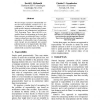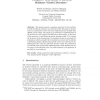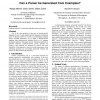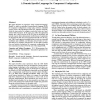123
click to vote
IWPSE
2010
IEEE
15 years 1 days ago
2010
IEEE
We describe our experiences with the process of designing a domain-specific language (DSL) and corresponding model transformations. The simultaneous development of the language an...
115
click to vote
INLG
2010
Springer
15 years 1 days ago
2010
Springer
We have begun a project to automatically create the lexico-syntactic resources for a microplanner as a side-effect of running a domain-specific language understanding system. The ...
138
click to vote
HIPEAC
2010
Springer
15 years 4 months ago
2010
Springer
This paper presents a program generator for fast software Viterbi decoders for arbitrary convolutional codes. The input to the generator is a specification of the code and a single...
168
Voted
AGTIVE
2007
Springer
15 years 6 months ago
2007
Springer
Meta-modeling is well known to define the basic concepts of domain-specific languages in an object-oriented way. Based on graph transformation, an abstract meta-model may be enhanc...
114
click to vote
SAC
2003
ACM
15 years 7 months ago
2003
ACM
One of the open problems in the area of domain-specific languages is how to make domain-specific language development easier for domain experts not versed in a programming languag...
107
click to vote
HICSS
2003
IEEE
15 years 7 months ago
2003
IEEE
A key advantage for the use of a Domain-Specific Language (DSL) is the leverage that can be captured from a concise representation of a programmer’s intention. This paper report...
109
click to vote
ER
2004
Springer
15 years 7 months ago
2004
Springer
Abstract. For systems that share enough structural and functional commonalities, reuse in schema development and data manipulation can be achieved by defining problem-oriented lang...
104
click to vote
EDOC
2008
IEEE
15 years 8 months ago
2008
IEEE
Service-Oriented Architectures (SOAs) have become an important cornerstone of the development of enterprise-scale software applications. Although a range of domain-specific langua...
103
click to vote
ICFP
2008
ACM
16 years 2 months ago
2008
ACM
This paper describes our experience using a functional language, Haskell, to build an embedded, domain-specific language (DSL) for component configuration in large-scale, real-tim...




